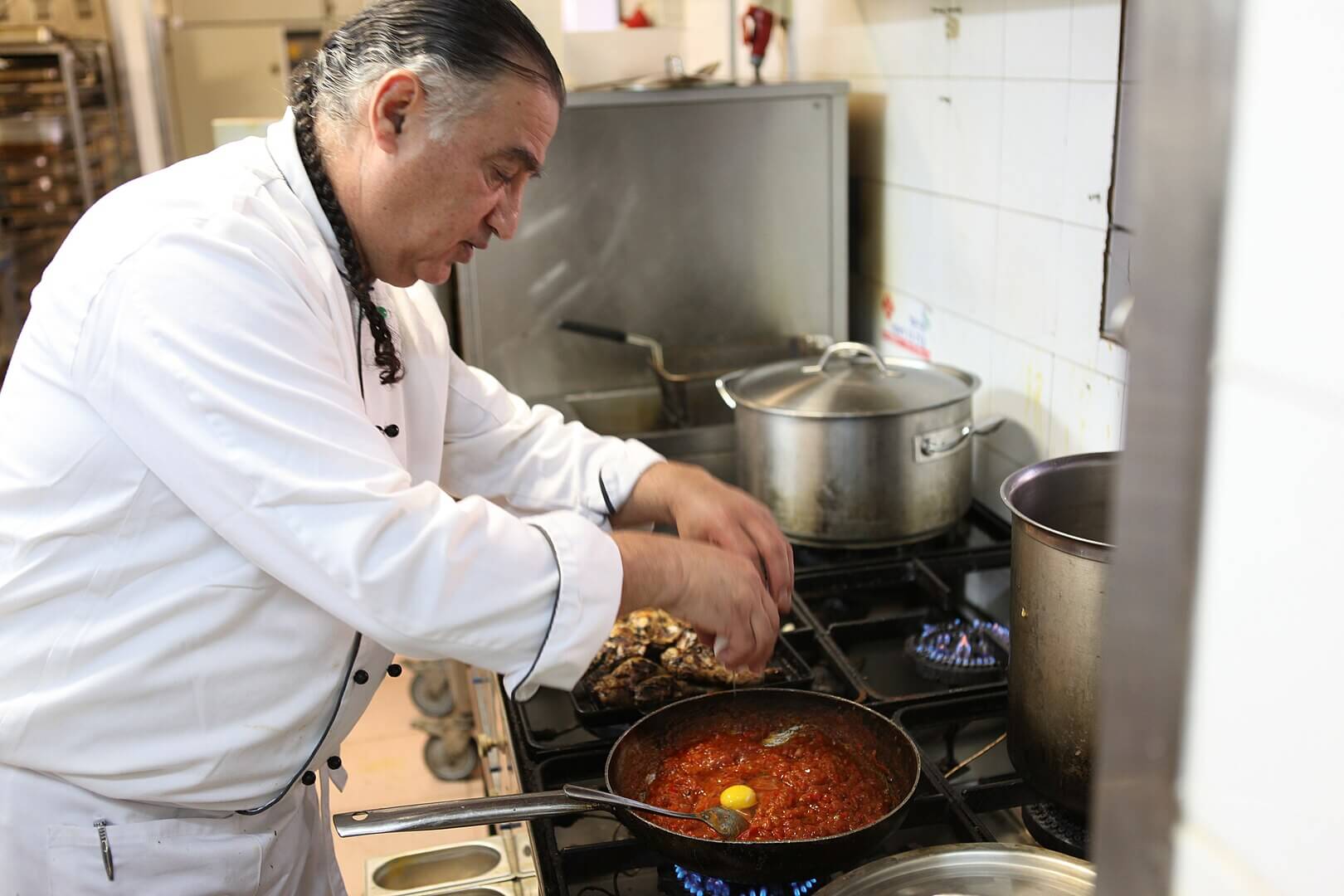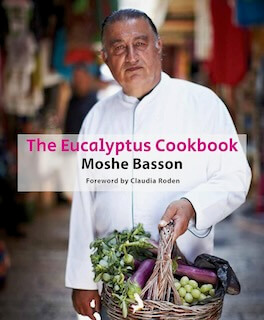Why did one of the best cookbooks of 2023 go unnoticed? Hint: It’s Israeli.
Moshe Basson’s ‘The Eucalyptus Cookbook’ never made the splash it deserved

Chef Moshe Basson preparing shakshuka at his Eucalyptus restaurant in Jerusalem. Courtesy of Eucalyptus
The Israeli chef Moshe Basson worked for a decade on a cookbook to convey the recipes that made his Jerusalem restaurant, Eucalyptus, world famous.
The restaurant featured local ingredients — many of which Basson foraged or grew himself — and drew on the recipes of his own Iraqi Jewish upbringing and the foods of Israel’s Jews, Muslims and Christians, some of whom worked side by side in his busy kitchen.
On Sept. 14, Basson held a launch party for The Eucalyptus Cookbook at his restaurant, scheduled just before a worldwide book tour beginning Oct. 9. In a world that made Yotam Ottolenghi a household name and rightly celebrated a slew of new Palestinian cookbooks, Basson’s cookbook seemed destined to find a big audience.
Then came Oct. 7.
Eucalyptus the restaurant closed its doors, and remains shuttered due to the lack of tourism. Eucalyptus the cookbook has received scant media attention — one review in The Jerusalem Post — because all things Israeli are attracting other kinds of headlines these days.
At a time when protesters chant outside Israeli restaurants in the United States, accusing them of stealing Palestinian food and erasing Palestinian culture, a positive review of an Israeli cookbook is asking for a social media meltdown.
And Basson’s multi-city United States book tour was, of course, canceled.
That’s too bad, because The Eucalyptus Cookbook offers up unique and captivating recipes — I spent the weekend cooking several of them. And Basson, who has spent his life synthesizing and celebrating the food of the region and using food to build bridges between Jews, Arabs and Christians — is a chef people need to hear, now perhaps more than ever.
‘Just leave me alone’
I called Basson just as the news broke on Jan. 22 of the deaths of 23 Israeli soldiers killed in Gaza.
“It’s a terrible day here,” he said.
In the scheme of the tragedy unfolding in Israel and Gaza, Basson is well aware that the cancellation of a book launch doesn’t rate. But that doesn’t make the days any easier.
“Some days, I wake up in the morning and cannot think about the restaurant and cooking and money, right?” he said. “It’s like, ‘Just leave me alone. I want to go to the forest to pick some herbs and mushrooms.’ And then another day I’ll have a nice phone call from an old client and I’ll say, ‘I must go in and open today.’”

Eucalyptus the restaurant is named for the tree Basson planted outside his original family home in Jerusalem more than 60 years ago on Tu B’shvat. After several moves and expansions, the restaurant ended up in the Artists Colony, an outdoor mall connecting the Old City and East Jerusalem to West Jerusalem.
Now, when harissa is the new chipotle and hummus is “the official dip” of the NFL, it’s easy to forget how much Eucalyptus changed Israel’s fine dining. Basson came of age when high-end tourist restaurants in West Jerusalem were pushing kosher Continental: bolognese with soggy pasta or Steak Diane that was, really, chuck steak, margarine and mushrooms.
Compare that to the last meal I ate at Eucalyptus, in spring 2019: a cumin- and turmeric-scented red lentil soup with roots in the biblical story of Esau and Jacob. Delicate stuffed eggplants based on the recipes of Basson’s mother, who immigrated from Iraq in 1950 when Basson was an infant. A maqluba, the upside-down chicken and rice dish taught to Basson by one of his Palestinian cooks, which he turned into a trademark tableside ceremony. An almond milk malabi, or pudding, drenched in hibiscus syrup, followed by a shot of Basson’s homemade fig liqueur, made with fruit foraged from nearby trees.
‘I don’t have to apologize’
It was a memorable meal, not least because of the way Basson consciously draws influences from biblical foods, Iraqi Jewish food, Palestinian and Jewish Middle Eastern dishes, and native fruits and herbs. Those are the elements that make up Basson’s recipes, and which he details in his cookbook.
“This is me,” he said. “This is my cooking. This book is me.”
Last Shabbat I cooked from his book. I made that lentil soup, which is shocked just before serving with a slurry of garlic, warm spices and fresh-squeezed lemon juice. I made it again the very next day, and my Shabbat guest texted me to say she bought the book online on the way home so she could make the soup too.
The same Shabbat meal I followed his mother’s recipe for ingria, an eggplant, quince and beef stew that bears the sweet and sour flavors of Iraqi cooking. I also made mechasha, which layers beets and rice with chard rather than rolling the ingredients inside the chard leaves. It’s Basson’s take on a traditional Middle Eastern stuffed vegetable. As promised, the flavors I remember from my meal at Eucalyptus came alive in my kitchen.
Basson worked on the book for a decade. His daughter Sharon Fradis helped with the writing and recipe testing.
“I belong to Slow Food,” he said, referencing the international movement to preserve and teach indigenous and traditional foodways. “So it was a slow book.”
Basson told me he hopes invitations will start coming in from Jewish communities in the U.S. for talks and cooking demonstrations. I asked him how he would face the online — and sometimes in-your-face — detractors who accuse Israeli Jewish chefs of stealing Palestinian food.
“I was born in Iraq,” said Basson. “I speak Arabic. I read and write in Arabic. Nothing here is yours or mine.”
He pointed out that foods like falafel and hummus arose from cultures where Jews and Arabs lived together, long before there were modern states. Even maqluba, as close to a Palestinian national dish as any, has roots in Iraq, first mentioned in the 13th-century Kitab Al-Tabikh (“Book of Dishes”) written in the Abbasid period by Muhammad al-Baghdadi.
“I don’t have to apologize that I’m cooking Israeli food,” he went on. “Someone will say that it’s also Palestinian, and I say ‘Welcome, yes, it’s also Palestinian. And it’s biblical and it’s Iraqi and it’s Syrian.’”
‘Everything has changed’
In her introduction to Basson’s cookbook, Claudia Roden, the acclaimed Jewish and Middle Eastern food expert, took note of the “harmony that reigns” in Basson’s restaurants.
Basson’s assistant manager is an Arab Christian who started as a waiter (“Now he tells me what to do,” Basson told me). Muslims, Christians and Jews worked side by side in the kitchen.
“They argued about how you cut the parsley, nothing about politics,” he said.
With the restaurant closed, the workforce has scattered. Basson stays in touch with them still, helping to arrange government financial support while the conflict drags on.
Other attempts at harmony have petered out. Many years ago, Basson co-founded Chefs for Peace, an organization of top Jewish and Arab chefs created to strengthen cultural understanding through food. Since Oct. 7, it has gone dormant. Its last Facebook post, in late December, promised the organization would resume some time in the future.
Basson wrote a gem of a cookbook — one of the most original, interesting and heartfelt Jewish cookbooks of the year. He created and ran a wonderful restaurant where East Jerusalem met West.
Whether any of it has a future, what normal will look like when this war is over, is anyone’s guess. Will the brutality of this conflict radicalize chefs and their staffs — and cookbook buyers — as it has so many others? Food is a way to connect cultures and bridge differences, but it’s not fairy dust. The hostages must come home. The fighting must stop. Ultimately a just solution to the conflict is what will enable Israelis and Palestinians to cook and eat in peace. But none of that, for now, is on the menu.
“Everything has changed,” said Basson. “I don’t know what will be.”





















